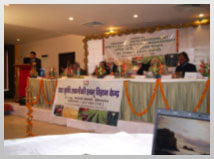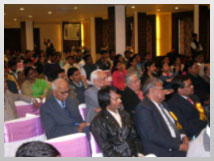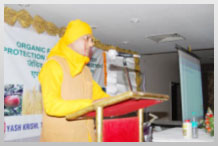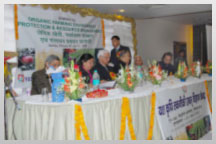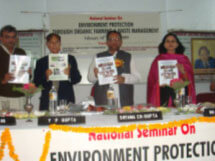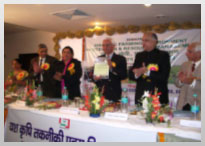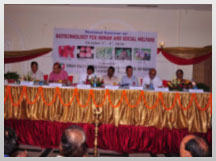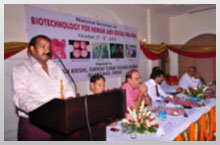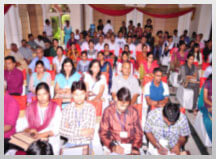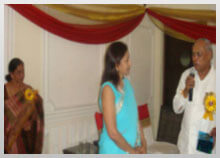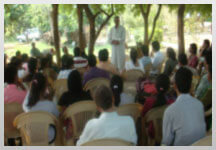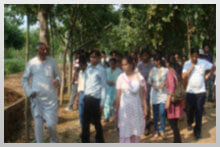National Seminars
The following National Seminars have been organized so far. In addition, NGO has also contributed to various other National and local Seminars and Workshops.
Some briefs & glimpse of National Seminars
A. Allahabad Vision 2020 Organized In 2006
This seminar was organized because of backwardness of city of Allahabad as it legs in many ways and it should be developed as a modern city. This is especially true, when Country is aiming to achieve 10% GDP growth and high amount of FDI. But Allahabad has only about 1% GDP growth and almost zero FDI. This is when China has $ 53.3 Billion of FDI and India has about $ 4.3 billion FDI. Even the literacy rate for this city is very low. There are about 30% people illiterate. Though, Allahabad is a Cultural / Religious city where HOLY SANGAM is located. People come here from all over the Country to have a HOLY dip in Sangam, though; Ganga and Yamuna water has high pollution. Allahabad is lacking in infrastructure facilities so as to attract Business, Tourists, Industry etc. Presently, Allahabad is not in Tourist Map of UP. Following recommendation was made.
Guava Research Centre – To develop varieties of Guava & its processed items like Juice, Jelly, etc.
Water Quality And Resource Management Organized In 2007
Organic Farming, Environment Protection, And Resource Management Organized In 2008
Environment Protection Through Organic Farming And Waste
Management Organized In 2009
Ganga Water Development Centre – To develop a methodology to clean Ganga water.
Ramayan Research Institute – To propagate the good values of life.
Parks all along River Ganga and Yamuna between six bridges located in Allahabad.
Ganga River front development all along river Ganga from Phaphamau Bridge to New Ganga Bridge under construction on Allahabad by – pass road near Muratganj. – To give extra Land for Development and expansion along with the construction of Holiday resorts etc.
Construction Waste Material (Malwa) Utilization Centre.
- Hi-tech city. – To give a boast and another dimension to City for electronic and Software Industry.
Village labor sheds in Satellite towns – On the pattern of Sulabh Sauchalay, so that they do not sleep on pavement or make Gumties.
South By pass Road and Rail Line from Sayed Sarawan to Chaka Block with a bridge on Yamuna.
- Regular Planning for 5 satellite towns as Naini, Jhusi, Phapamau,Kalindipuram and Gandhi Nagar (Mahewa) with all basic facilities.
Fly over at Rambagh Railway line, Naini Railway station, Prayag Railway Station, IOC Railway crossing near Kalindi Puram and along NH2 near High court.
Four tier Car parking Spaces be made in Civil lines, Chauk, Katra & near High Court.
Airport Development


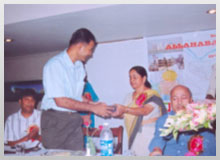
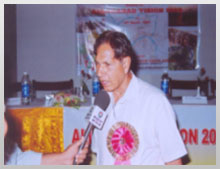
B. Water Quality And Resource Management Organized In 2007
The water resources are drying up. Otherwise wherever there is water it is much polluted. Thus the seminar discussed the ways and means how to retain or conserve water and the methods to clean it through cheaper methods.
C. Organic Farming, Environment Protection, And Resource Management Organized In 2008
I. Food is next to water & air in importance for subsistence of human life on earth. With the increasing human population all the over the World, food is becoming a scarce resource day by day and this is going to be scarcer in the days to come. Further, with the shrinking cultivable land resources, the demand to produce more and more food produce per unit area has resulted Agriculture becoming heavily dependent on chemical inputs viz. FERTILIZERS as source for plant nutrients and PESTICIDES for protection of crops from pests & diseases. In as much as, the above are being increasingly & indiscriminately used they are posing a threat to life and environment. Besides, this dumping of chemicals in environment is also destroying so many microorganisms, birds, insects which were beneficial to farmers. With farming becoming chemically intensive, the lands are becoming barren and the poor farmers are finding themselves entangled in increased debts.
II. FARMING traditionally means organized cultivation of selected crops- mainly to meet the three basic needs of man- i.e. food, shelter and clothing. To avoid hazardous effects of these pesticides, other soft and eco-friendly methods in crop production must be adopted. ORGANIC FARMING, therefore, is a necessity now, which must be practiced for all kinds of crop cultivation. Organic farming means Production of Qualitative Product, free from any hazard of residual toxicity, produced in harmony with nature. Organic farming reduces the input cost as it reduces the farmer’s dependence on costly chemicals, generates plenty of rural employment through in-sourcing rather than outsourcing (like producing vermin-compost etc, herbal pest repellants). Organic farming also establishes an ecological balance with nature and takes a proactive approach towards environment. Besides the global market for organic products by 2010 is expected to be around 35 billion US dollars.
III. Second aspect in the seminar is Environment Protection and Resource Management. As a consequence of use of chemical FERTILIZERS and PESTICIDES for growth and protection of crops, pollution level of food products, soil, water & air is increasing at a very fast rate. As we directly use water for drinking and eat food every day, all this is posing a serious threat to man & environment. As per WHO survey, India was ranked 120th in a list of 122 nations of the world, evaluated for water quality having more than specified tolerance limits of nitrates and pesticides. These aspects have been discussed in the seminar and recommendations were made.
D. Environment Protection Through Organic Farming And Waste Management Organized In 2009
The seminar on “Environment Protection through Organic Farming and Waste Management” was organized for finding ways for efficient utilization and management of Waste so as to recognize it as an asset & resource rather than waste. This will help to minimize and recycle the waste and will ensure cleaner, healthier & sustainable environment besides helping in organic cultivation of crops and providing employment opportunities at local levels. During Seminar the discussion were held under following themes:
Municipal waste and Its Processing
Use of Waste Material in Construction Industry
Use of Waste as Manure for Organic farming
Energy from Waste Materials and Employment Generation
Industrial and Electronic Waste Management
On the basis of discussions, following recommendations were made at the end of Seminar:
To achieve quality of life, a good infrastructure planning for disposal of waste is needed and then its sincere implementation will be the need of hour.
In the present seminar a technique has been included to use such Polythene Waste as part mixing for construction of Bituminous Roads. It is reported that plastic mixed Bituminous mix in roads has better stability and more resistant to water exposure.
Construction industry waste etc could be easily recycled and made into useful bricks and useful concrete.
- Organic matter which is about 15% in any garbage dump can be decomposed in organic matter through Earthworm or NADEF technology. Through this technology we can produce good Organic manure which can be used for Natural Farming.
E. Biotechnology For Human And Social Welfare Organized In 2010
During the Seminar the discussions were held on the following themes:
Agricultural Biotechnology
Animal Biotechnology
Medical Biotechnology
Industrial Biotechnology
Environmental Biotechnology
Bioinformatics & Nanotechnology
Biopatenting / IPR issues/ Threats (Biopiracy / Biowar / Bioethics)
Following recommendations were made during the plenary session:
1. Strong policy support for Biotechnology related programs is urgently required. This will be the only way if the advances made in this field of bio- technology are to be reaped for human and social welfare and for solving the problems of food security, hidden hunger/malnutrition etc arising due to ever increasing human population.
2. Government of India should adopt the general policy about GM crops /seeds without fear and then the policies are to be pursued through regular programs to educate / create awareness amongst farmers and common man to adopt GM crops with confidence, if we are aiming to double crop yields in next 10 years.
3. Bio-safety of biotechnology products like BT Brinjal etc needs to be thoroughly investigated / evaluated before its adoption to minimize any risks / fears whatsoever. Afterwards, general education and awareness programs need to be conducted for farmers and Society.
4. There is an urgent need to develop, through biotechnology, the tailor- made plant / animal genotypes – varieties for improved quality and yields.
5. Conservation of rare plants & animal species through use of biotechnology techniques.
6. To develop and multiply crop genotypes suitable for wastelands, dry lands, wetlands, submerged lands, fast growing forest tree species using Biotechnology.
7. Develop crop plants with value addition like protein and mineral enriched species / better shelf-life / pest-disease resistance / better aesthetic properties in cheaper food crops like potato / high yielding cattle, poultry etc using biotechnology for welfare of common man.
8. Waste management and environment protection through the use of biotechnology be taken up in big way.

